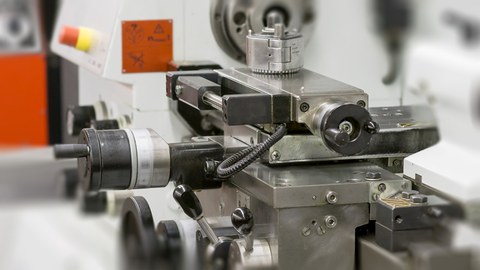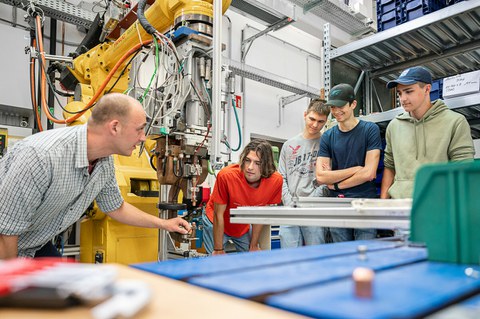Metall- und Maschinentechnik
Das Studium in der Beruflichen Fachrichtung Metall- und Maschinentechnik (MMT) befähigt dazu, nach dem ersten Staatsexamen das Referendariat an einer berufsbildenden Schule (Berufsschule, Berufsfachschule, Fachschule, Berufliches Gymnasium usw.) im Berufsfeld11 „Metalltechnik“ zu absolvieren und anschließend als Lehrkraft im Berufsfeld zu unterrichten. Das heißt, dass die Absolvent:innen nach dem Studium in der Lage sind, in den zugeordneten Berufen zu unterrichten.
Inhaltsverzeichnis
Dem Berufsfeld zugeordnete Berufe sind vor allem
- Anlagenmechanikerin
- Anlagenmechaniker:in für Sanitär-, Heizungs- und Klimatechnik
- Behälter- und Apparatebauer
- Büchsenmacher:in
- Chirurgiemechaniker:in
- Fachkraft für Metalltechnik
- Fahrzeuginterieur-Mechaniker:in
- Feinpolierer:in
- Feinwerkmechaniker:in
- Fertigungsmechaniker:in
- Fluggerätmechaniker:in
- Gießereimechaniker:in
- Graveur:in/Metallbildner:in
- Industriemechaniker:in
- Klempner:in
- Konstruktionsmechaniker:in
- Maschinen- und Anlagenführer:in
- Metallblasinstrumentenmacher:in
- Metall- und Glockengießerin
- Metallbauer:in
- Oberflächenbeschichter:in
- Ofen- und Luftheizungsbauer:in
- Präzisionswerkzeugmechaniker:in
- Schiffsmechaniker:in
- Schneidwerkzeugmechaniker:in
- Stanz- und Umformmechaniker:in
- Technische:r Modellbauer:in
- Technische:r Produktdesigner:in
- Uhrmacher:in
- Verfahrensmechaniker:in
- Verfahrenstechnolog:in Metall
- Vorpolierer:in der Schmuck- und Kleingeräteherstellung
- Werkzeugmechaniker:in
- Zerspanungsmechaniker:in
fett = „Kernberufe“; normal = weitere oft zugeordnete Berufe
Weitere, mechatronische Berufe sind:
-
Mechatroniker:in
-
Mechatroniker:in für Kältetechnik
-
Produktionstechnolog:in
Fachrichtungskombinationen
Die Fachrichtung ist neben anderen allgemeinbildenden Fächern (außer Biologie) auch mit den zweiten Fachrichtungen Chemietechnik, Elektrotechnik und Informationstechnik sowie Fahrzeugtechnik kombinierbar. Als zweite Fachrichtung kann diese Fachrichtung mit der ersten Fachrichtung Elektrotechnik und Informationstechnik studiert werden.
Die Kombination der Fachrichtungen Metall- und Maschinentechnik und Elektrotechnik und Informationstechnik deckt insbesondere die mechatronischen Berufe ab.
Studium
Grundlage für die universitäre Ausbildung in der beruflichen Fachrichtung Metall- und Maschinentechnik sind verschiedene, korrespondierende Ingenieurwissenschaften. In erster Linie ist dabei der Maschinenbau u. a. mit den Inhalten Konstruktions-, Werkstoff-, Fertigungs-, Grundlagen der Mess- und Automatisierungstechnik und der Arbeitswissenschaft und Arbeitsgestaltung zu nennen. Als Vertiefungsrichtungen können gewählt werden: Produktionstechnik, Gebäudeenergie- und Versorgungstechnik und Luftfahrzeugtechnik. Gegenstand der Fachwissenschaften sind je nach Richtung beispielsweise Inhalte aus den Bereichen Fertigungsverfahren und Werkzeugmaschinen oder Wärmeübertragung und Energiespeichersysteme oder Luftfahrzeugauslegung und -konstruktion sowie Grundlagen der Luftfahrzeuginstandhaltung und -reparatur. Die Berufliche Fachrichtung greift in Forschung und Lehre weiterhin wichtige Aspekte des Berufsfelds auf. So geht es auch um die Weiterentwicklung der Produktion vor dem Hintergrund von Industrie 4.0 um vernetzte Produktion, Virtual und Augmented Reality oder den Einsatz von Künstlicher Intelligenz oder in der immer stärker mechatronisch ausgerichteten Gebäudetechnik die Herausforderungen u. a. des effizienten Einsatzes von Energie oder eines „Smart Home“.
Im Rahmen der Beruflichen Didaktik als ein Kernelement der Lehrer:innenbildung soll es erlernt werden, die in den Prozessen zum Tragen kommenden Kompetenzen zu analysieren, die Kompetenzentwicklung der Lernenden zu planen und die vielfältigen (Unterrichts-)Inhalte systematisch aufzubereiten, den Unterricht adressatengerecht auszugestalten, umzusetzen und reflektieren zu können.
(vgl. Pahl, J.-P./Herkner, V. (Hg.) (2010): Handbuch berufliche Fachrichtungen. Bielefeld. 446–476.)
Aktuelle Lehrveranstaltungen der Professur für Metall- und Maschinentechnik/ Berufliche Didaktik für die Fachrichtung Metall- und Maschinentechnik. (Link
LEMMA – Lehramtsbezogene Community-Plattform für Studierende und Lehrende der Fachrichtungen ETIT, FZT und MMT sowie OptLA-Studierende.
Wir haben Dein Interesse geweckt?
Weitere Informationen gibt es unter den folgenden Links
- Lehramtsstudium allgemein,
- Studium Lehramt an berufsbildenden Schulen sowie
- Studienoptionen für das technische Lehramt an beruflichen Schulen.
M.Sc. Alison Klein
<a target="_blank" class="ms-href external-link" data-a0="https://s" data-a1="ecuremail" data-a2=".tu-dresd" data-a3="en.de/web" data-a4=".app?" data-b0="rcpt=YWxp" data-b1="c29uLmtsZ" data-b2="WluQHR1LW" data-b3="RyZXNkZW4" data-b4="uZGU=">Eine verschlüsselte E-Mail</a> <span>über das SecureMail-Portal versenden (nur für TUD-externe Personen).</span>
Wissenschaftlicher Mitarbeiter
Professur für Metall- und Maschinentechnik/Berufliche Didaktik
Professur für Metall- und Maschinentechnik/Berufliche Didaktik
Besuchsadresse:
Münchner Straße 1, Raum MS1 578
01187 Dresden
- work Tel.
- +49 351 463-34573
Studienfachberater Höheres Lehramt an berufsbildenden Schulen BFR ET, MMT und FZT
Besuchsadresse:
Münchner Straße 1, Raum MS1 578
01187 Dresden
- work Tel.
- +49 351 463-34573
Fußnoten
-
Wenngleich die Berufliche Fachrichtung und das Berufsfeld identisch bezeichnet sind, gibt es einen wichtigen Unterschied. Während die Berufliche Fachrichtung die Studienfachrichtung und damit die Struktur der Lehreramtsausbildung an den Universitäten bezeichnet, wird unter dem Begriff des Berufsfeldes die Zuordnung einzelner (verwandter) Berufe verstanden. Folglich bereitet Sie das Studium – ungeachtet einer derzeit fehlenden systematischen und formal gültigen Zuordnung – darauf vor, in den zugeordneten Berufen zu unterrichten. Eben dies ist ein zentraler Unterschied gegenüber der allgemeinen Bildung, die auf ein Fach vorbereitet.


